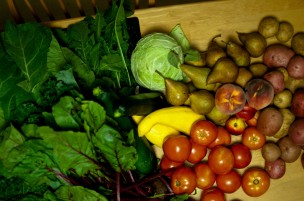On a warm afternoon in early September, about 50 students gathered in a leafy backyard on Home Avenue. Sitting in a loose circle, the students listened as a barefoot Will Curran-Groome ’14 and a long-haired Scott Zimmer ’14 gave a brief introduction of the Local Co-op to those not yet in the know.
Curran-Groome and Zimmer rattled off the various shares available through the co-op this semester. Produce, dairy, meat, egg, bread, and seitan and tofu have been consistently offered since fall 2012, while “preserved foods” was rolled out as a brand-new option. The meeting was brief, and almost entirely focused on logistics—more an opportunity to pass around an email list and answer burning questions than to discuss the nuances of local food politics or pass around recipes for Lacinato kale salad.
Yet the story of the Local Co-op is a story of politics and community. It started, according to Zimmer and Jon Lubeck ’14, with a hunger strike, or rather, the prospect of a hunger strike.
About three years ago, a now-graduated student (Zimmer and Lubeck differ on their accounts of who the student was) threatened to stop eating if she could not opt out of the meal plan in order to purchase her own local food.
“So, eventually, Bon Appétit yielded and let her use half her points toward local food and brought up the possibility that she also could spend the rest of her money on a local co-op,” Lubeck said.
Despite what might seem like a tense beginning to the program, those involved with Local Co-Op say that Bon Appétit, the company that Wesleyan contracts to manage most food on campus, has been extraordinarily supportive. According to Zimmer, Bon Appétit Resident District Manager Michael Strumpf and Bon Appétit Production Chef Ernie Arroyo are longtime champions of the effort.
“They’ve always just wanted to add local food wherever they can,” Zimmer said. “They’ve supported us over other co-ops even, because they feel strongly about local food and I think we’ve earned their respect.”
Though early support from administrators was strong, the co-op took two semesters to go fully public. Beginning as a small program capped at only 30 people, Local Co-op was joined in its first year mostly by those who lived in or had connections to the Earth and Farm program houses, who heard about it through word of mouth.
“I think Bon App’s main concern has been that our organizational capacity doesn’t fall short of people’s interest,” said Curran-Groome.
Over the past year since Local Co-op held its first public interest meeting, however, interest has skyrocketed. In the spring semester of last year, Zimmer noted, organizers were distributing shares to about 300 students. This year is shaping up to be similarly hefty in numbers of students and in crates of food—Lubeck tallied the numbers from Sunday’s sign ups at over 200 people, and the online form will be open until Tuesday evening.
The popularity of the Local Co-op is a sign of many University students’ keen interest in their food being not only delicious, but also a mechanism through which they can alter and interact with the community around them.
“I was buying over 1,000 dollars in produce every week, which is pretty cool,” Zimmer said. “It feels empowering to put that much money toward good people every week. And you see these pallets of food that are being distributed every week, and that’s pretty cool.”
Sourcing enough food to feed the many hungry members of the co-op is a communal effort, and not always an easy one.
“Some things are harder than others,” Zimmer said. “Like eggs. No one has 50 dozen eggs that they’re not already selling that are free range and good eggs.”
For this reason, the Local Co-op must source their eggs from a variety of local farms. Sourcing produce and meat, while less complicated, is no picnic either. The organizers are keen to point out that almost all the people they source from are incredibly cooperative.
“They’re really nice, they’ve been really accommodating,” said Curran-Groome about Four Mile River Farm, from which the meat share members receive a variety of pasture-raised meats throughout the semester. “We have an odd ordering dynamic in terms of lots of specific requests each week rather than buying 30 pounds of hamburger in bulk.”
Zimmer says that while running the produce share he has run into a similar problem of the Local Co-op necessitating some departure from the norm for most producers.
“We kind of buy a funny amount of produce,” he said. “We buy a lot more than any one person would ever be buying, but not enough to approach a huge farm. So it took me a while to find the right kinds of farms.”
One of these farms turned out to be George Hall Farm, which Zimmer seems particularly fond of.
“It’s kind of funny,” he said. “I talk to these people on the phone every week. They’re a very small family farm in West Simsbury, Connecticut. It’s about 45 minutes away. Certified organic, really nice, cool people. So it’s always nice to call them and talk to this old guy about like, ‘Oh, we got the romanesco coming in this week.’”
For those interested in bagging some of that romanesco for themselves, Local Co-op sign-ups will be open until Tuesday evening. Email wesleyanlocalcoop@gmail.com with questions, or check out the group’s Sept. 8 post on Wesleying.
-
kfc eater
